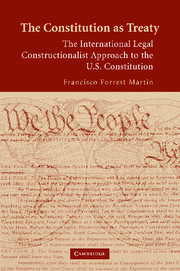 The Constitution as Treaty
The Constitution as Treaty Book contents
- Frontmatter
- Contents
- Prologue
- Introduction
- PART I UNITED STATES COURTS AS INTERNATIONAL COURTS
- PART II INTERNATIONAL LAW
- PART III UNITED STATES LAW AS INTERNATIONAL LAW
- 5 Article III, International Legal Interpretation
- 6 Extra–Article III, International Legal Interpretation
- 7 The General Liberal Construction Rule: Extending Lynham to Other Article III and Extra–Article III International Law
- Conclusion
- Epilogue
- Index
5 - Article III, International Legal Interpretation
Published online by Cambridge University Press: 27 July 2009
- Frontmatter
- Contents
- Prologue
- Introduction
- PART I UNITED STATES COURTS AS INTERNATIONAL COURTS
- PART II INTERNATIONAL LAW
- PART III UNITED STATES LAW AS INTERNATIONAL LAW
- 5 Article III, International Legal Interpretation
- 6 Extra–Article III, International Legal Interpretation
- 7 The General Liberal Construction Rule: Extending Lynham to Other Article III and Extra–Article III International Law
- Conclusion
- Epilogue
- Index
Summary
Article III states that the federal courts have law claims jurisdiction over
All Cases, in Law and Equity, arising under this Constitution, the Laws of the United States, and Treaties made, or which shall be made, under their Authority.
Recall that the word “federal” comes from the word “foedus,” which is a treaty. Accordingly, “federal” law is intrinsically “treaty” law. Article III empowers federal courts to adjudicate cases by applying and interpreting three sources of international law: (i) the Constitution, which is a treaty; (ii) treaties to which the United States are parties; and (iii) federal statutory law implementing the Constitution, other U.S. treaties, and the law of nations.
The Supreme Court has original jurisdiction in Article III, international law claims cases “affecting Ambassadors, other public Ministers and Consuls, and those in which a State shall be a Party.” And Congress has vested original jurisdiction of Article III, international law claim cases in the federal district courts for both criminal and civil matters.
U.S. CONSTITUTION: THE INTERNATIONAL LEGAL CONSTRUCTIONIST APPROACH
The International Legal Constructionist (ILC) approach to constitutional interpretation requires that the Constitution's text be construed in conformity with the United States' international legal obligations because the Constitution is a treaty that per the conventional law of nations must be construed in conformity with the states-parties' other international legal obligations.
- Type
- Chapter
- Information
- The Constitution as TreatyThe International Legal Constructionalist Approach to the U.S. Constitution, pp. 107 - 147Publisher: Cambridge University PressPrint publication year: 2007


